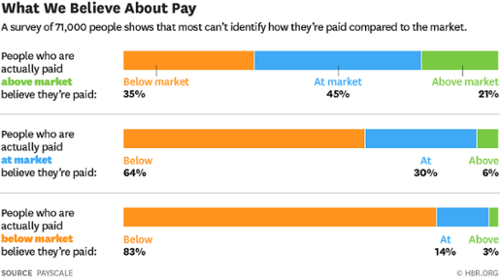I recently read a great blog on employee engagement which said compensation perception (am I fairly paid) has some huge disparities in the market.
The gap that is created (I am not paid what I am worth) is a key driver in lower employee engagement and is a leading indicator for likelihood to leave.
What can HR do about it?
Dave Smith, the Chief Product Officer at PayScale, recently wrote a great blog in the Harvard Business Review titled: Most People Have No Idea Whether They Are Paid Fairly. In his blog he presented some comprehensive research showing how employees are very often wrong in terms of how their compensation compares to the market. Per Dave Smith:
"Pay is a crucial component of engagement because it’s not just a number; it’s an emotional measure reflecting how valued an employee feels by their employer. And it turns out, how people feel about their deal plays a huge role in how engaged they are in their work. While there’s still a lot to learn about the connection between the perception and reality of compensation, and how both relate to engagement, we identified a few interesting data points that may change how you talk to your employees about pay.
First, people are often wrong about how much they’re paid compared to the going market rate. Perceptions about pay don’t always reflect reality, even if employers are paying the same — or more — than similar companies. In fact, a whopping two-thirds of people who are being paid the market rate believe they’re actually underpaid, representing a huge discrepancy"..
The findings from the comprehensive PayScale study are well worth noting because they show significant numbers of people who are paid “at or above the market” actually believe that they are underpaid.

The major implication from this “perception gap” is that employees are more likely to leave if they feel they are not paid fairly. As Dave Smith points out:
“perceptions about pay play a significant role in an employee’s desire to leave your company. This may sound obvious, but our survey showed that “intent to leave” decreased in relation to how favorable an employee felt about their pay. For example, 60% of employees who perceived they were underpaid said they intended to leave, compared to only 39% of those who perceived they were overpaid. The bottom line is this: if you don’t communicate to your employees that they are being paid fairly compared to their talent market, they may leave”.
The solution recommended by PayScale to employers is transparency – be open about your compensation practices. The more open you are the better the employee will be able to intelligently understand why they are paid at the level that they are. An open dialogue also removes the secrecy and any perceived deception that comes with a compensation practice that is based on secrecy.
As Dave Smith concludes:
“Clearly, having transparent and honest conversations with employees is a no-cost way to improve engagement. But for many businesses, it represents a challenge because it means adopting a whole new mindset around pay. Employers today should arm managers with accurate market data reflecting talent markets to base the conversation in fact.
These discussions should not only show employees how their pay was determined, but also how pay relates to performance or responsibility, and what it takes for an employee to get to the next pay grade. Finally, they need to remember that how their employees feel about compensation matters just as much as what they’re actually being paid. When it comes to having a more engaged workforce, you can’t assume that an employee’s perception about pay matches reality”.
An effective talent management program is built on open/honest dialogue. Addressing compensation head on will go a long way to improve employee retention and engagement.
Credit for this blog goes to:
Dave Smith is the Chief Product Officer at PayScale, creator of the world’s largest database of unique salary profiles. He leads a team that builds compensation solutions designed to help businesses attract and retain talent.
![]()



